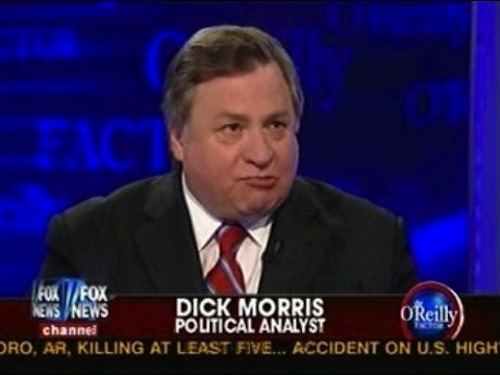On Halloween, political analyst and former Clinton adviser Dick Morris besmirched the good name of The O’Reilly Factor by predicting that Mitt Romney would win in a landslide. He had sailed that claim majestically around the mediasphere for weeks, despite the fact that it was, you know, insane. Romney did not win in a landslide. No actual data suggested he would, but Morris—an ostensibly unbiased analyst—had, in his own words, “worked very hard for Romney.” Was he deluding himself? Kind of. Was he deluding others? Also yes, kind of, as he explained to Sean Hannity in a thicket of prevarication that is the subject of today’s close reading. Props to Ben al-Fowlkes for the link. Bad faith after the jump.
Here’s Morris telling Hannity why he wasn’t lying and also felt that it was his duty to mislead people:
Sean, I hope people aren’t mad at me about it… I spoke about what I believed and I think that there was a period of time when the Romney campaign was falling apart, people were not optimistic, nobody thought there was a chance of victory and I felt that it was my duty at that point to go out and say what I said. And at the time that I said it, I believe I was right.
I never borrowed your plate, she said, and it was cracked when you gave it to me. Morris’s justification turns on two main ideas, and they’re mutually exclusive. There’s his initial claim that “I spoke about what I believed,” which all but the most charitable reading would interpret as meaning that he believed Romney would win. That is, ideally, what a political analyst predicting a decisive win for Romney would think.
Except it was also wrong—comically wrong in a way that impugns Morris’s ability as a predictor, if not a thinking person. He can’t have that. So he immediately follows up his claim that he genuinely believed Romney would win with the assertion that nobody thought he would win. “People were not optimistic,” he says; “nobody though there was a chance of victory, and I felt that it was my duty…to say what I said.”
That’s a different argument entirely. When Morris says it was his duty to predict a landslide because the Romney campaign was falling apart, he as much as admits that he used his position as an analyst to benefit one candidate. He took one for the team, as it were, since no one believed Romney was actually winning—even though three seconds earlier, Morris said he “spoke what [he] believed.”
So it’s a conundrum. The two things he just said consecutively cannot both be true, yet he is on TV at that moment explaining why he does not lie on TV. But Morris is an old pro, and he resolves the problem with a sentence too beautiful for this world:
And at the time I said it, I believe I was right.
Now that is some grade-A weaseling. The hideous efficacy of Morris’s sentence turns on two elements: the tense shift, and the multiple meanings of the word “right.” There’s right as in “correct,” which does not make sense. If it did, Morris would say, “at the time I said it, I believed I was right.” That wouldn’t be true, though, because he just said he didn’t believe he was right, and only predicted the Romney landslide to shore up the Romney campaign. Yet Morris also could not possibly be arguing that he now believes he was right to predict a Romney landslide, because 126 electoral votes.
So maybe Morris means “morally right,” and that at the time predicting Romney would win was the right thing to do. Again, though, “believe” thwarts that reading, since Morris is speaking to defend what he admits was a mistake. He cannot possibly be saying that he did the right thing on his apology tour. “I hope people aren’t mad at me about it,” was the first thing he said in the interview, and also maybe his last truthful statement.
There is no coherent reading of Morris’s statement. That’s what’s beautiful about it, because the synthesis of all his contradictory interpretations is that he thought it was true then, was only lying to help the Romney campaign, and was in fact right all along. As long as you do not apply the constraints of an actual world to which Morris’s statements pertain, it’s the perfect thing to say.
Of course, if you think words mean something, it’s a terribly clumsy lie. It’s a bad lie to excuse a bad lie. But if you thought like that, why would you become a biased political analyst/disgraced political aide in the first place? You would have to spend your whole career lying to yourself, to the point where you weren’t even sure how well you were lying to everybody else.





I despise Dick Morris. Why anyone would listen to, let alone believe a word that pops out of his face-hole, is beyond me. ‘Nuf said.